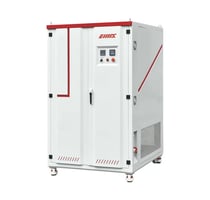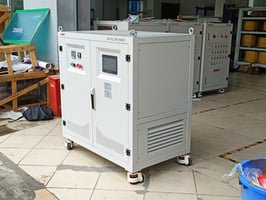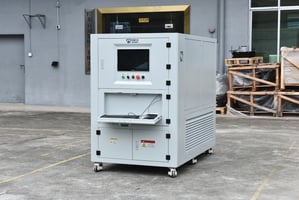In today's world, Uninterruptible Power Supplies (UPS) play a critical role in ensuring the...
The Future of Load Testing: Exploring Liquid Cooling Load Banks
In today's rapidly advancing technological landscape, precision and efficiency are more important than ever for industries reliant on electrical systems. A key component in ensuring the reliability of these systems is load testing. Traditional air-cooled load banks have long served this purpose, but as electrical systems grow more sophisticated, so does the need for innovative solutions. This is where liquid cooling load banks come into play. These cutting-edge systems provide superior performance and efficiency, making them an essential tool for modern industries.
In this blog, we’ll explore the benefits of liquid cooling load banks, their applications, and why they are becoming the go-to solution for load testing in critical environments.

What is a Load Bank?
Before diving into the specifics of liquid cooling load banks, let’s briefly review what a load bank is. In essence, a load bank is a device designed to simulate electrical loads for testing purposes. By replicating the real-world load conditions, engineers and technicians can evaluate the performance and reliability of power sources such as generators, batteries, and uninterruptible power supplies (UPS).
The Need for Advanced Cooling Solutions
As electrical systems become more powerful, they also generate more heat during operation. Traditional air-cooled load banks may struggle to manage the rising heat levels effectively, which can lead to overheating, reduced efficiency, and even damage to critical components. Enter liquid cooling load banks, which provide a more efficient and effective cooling solution for modern power systems.
Unlike air-cooled load banks, which rely on fans to dissipate heat, liquid cooling load banks use a closed-loop liquid system to absorb and transfer heat away from the load bank’s components. This process not only increases the system’s cooling capacity but also ensures a longer lifespan for the equipment, greater accuracy in testing, and minimized risks of overheating.
Key Benefits of Liquid Cooling Load Banks
1. Enhanced Thermal Management
One of the most significant advantages of liquid cooling load banks is their superior thermal management. Liquid has a much higher heat capacity compared to air, allowing it to absorb more heat without reaching critical temperatures. This feature makes liquid cooling ideal for high-power applications where large amounts of heat are generated.
By effectively managing heat, liquid cooling load banks ensure consistent and reliable performance, even under heavy load conditions. This translates to more accurate testing results and less wear and tear on the equipment being tested.
2. Compact Design
Liquid cooling systems are more efficient at transferring heat, allowing for a more compact design compared to air-cooled counterparts. This means that even in space-constrained environments, liquid cooling load banks can be used without sacrificing performance. The reduced footprint is particularly advantageous in industrial settings where space optimization is crucial.
3. Quieter Operation
Another notable advantage of liquid cooling load banks is their quieter operation. Air-cooled systems rely heavily on fans, which can be noisy, especially in high-load scenarios. In contrast, liquid cooling systems operate with minimal noise, making them more suitable for environments where noise reduction is important, such as data centers or research labs.
4. Energy Efficiency
With rising energy costs and growing environmental concerns, energy efficiency has become a critical factor for industries. Liquid cooling load banks consume less energy than traditional air-cooled systems, as they don’t require large fans or additional cooling mechanisms. This reduction in energy consumption leads to lower operational costs and a smaller carbon footprint.
5. Increased Equipment Longevity
Overheating is one of the primary causes of equipment failure. By providing superior cooling performance, liquid cooling load banks help extend the lifespan of both the load bank and the equipment being tested. This increased longevity translates into cost savings over time, as companies can avoid the need for frequent replacements or repairs.
Applications of Liquid Cooling Load Banks
Liquid cooling load banks are used in a variety of industries where precision and reliability are critical. Some key applications include:
- Data Centers: The need for reliable power in data centers is paramount, and liquid cooling load banks provide the necessary accuracy and efficiency to ensure backup systems function optimally during power outages.
- Aerospace and Defense: High-performance equipment used in these industries generates significant amounts of heat, making liquid cooling load banks essential for thorough load testing.
- Renewable Energy: As renewable energy systems like solar and wind become more prevalent, liquid cooling load banks are essential for testing the performance and stability of these systems under varying load conditions.
- Marine and Offshore: In environments where space and cooling efficiency are at a premium, liquid cooling load banks offer an ideal solution for testing critical marine and offshore power systems.
Why Liquid Cooling Load Banks Are the Future
The increasing complexity of electrical systems requires load banks that can handle high power levels while maintaining efficiency and accuracy. Liquid cooling load banks offer a future-proof solution by delivering superior thermal management, energy efficiency, and equipment longevity.
As industries continue to adopt advanced technologies, the demand for reliable power testing solutions will only grow. For companies looking to stay ahead of the curve, investing in liquid cooling load banks is a smart move that will ensure their electrical systems are tested with precision and reliability.
Conclusion
In conclusion, liquid cooling load banks represent the next generation of load testing solutions, offering unparalleled performance, efficiency, and reliability. Whether you're in the data center, aerospace, renewable energy, or marine industry, these systems provide the advanced cooling and load-testing capabilities needed to keep your operations running smoothly. By embracing this cutting-edge technology, companies can future-proof their testing processes and ensure long-term operational success.
For more information on how liquid cooling load banks can benefit your business, feel free to contact us today.

.jpg?width=679&height=679&name=30KW%E6%B6%B2%E5%86%B7%E6%9C%BA%E6%9E%B6%E5%BC%8F%E8%B4%9F%E8%BD%BD%E7%AE%B1%20(2).jpg)
.jpg?width=554&height=554&name=30KW%E6%B6%B2%E5%86%B7%E6%9C%BA%E6%9E%B6%E5%BC%8F%E8%B4%9F%E8%BD%BD%E7%AE%B1%20(5).jpg)


